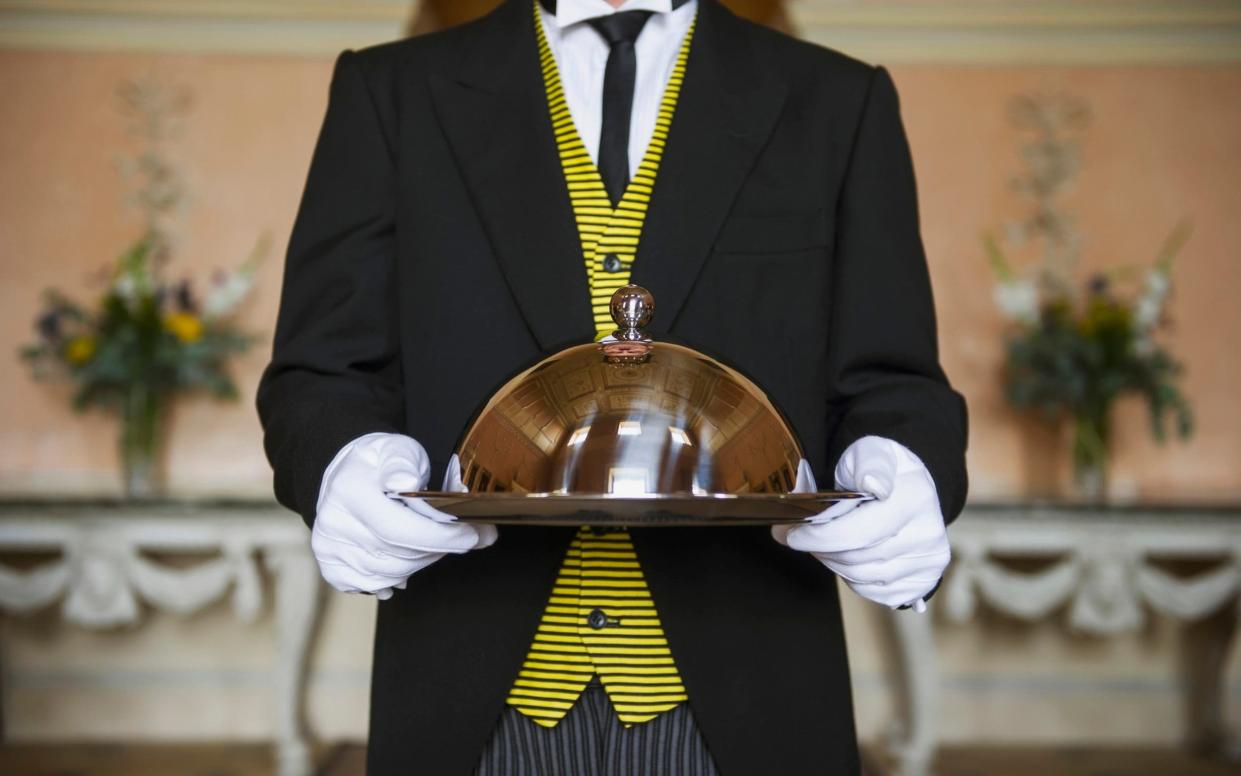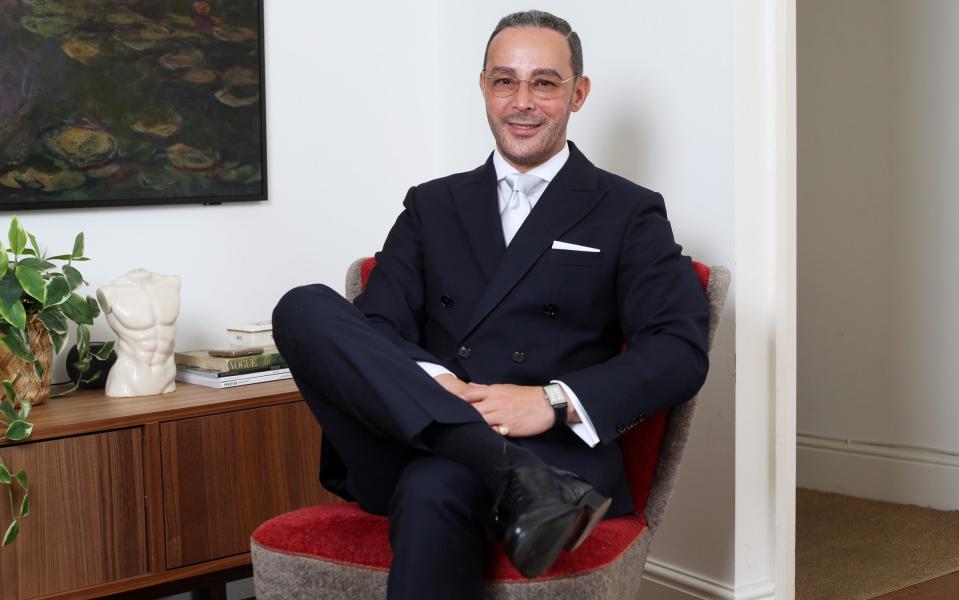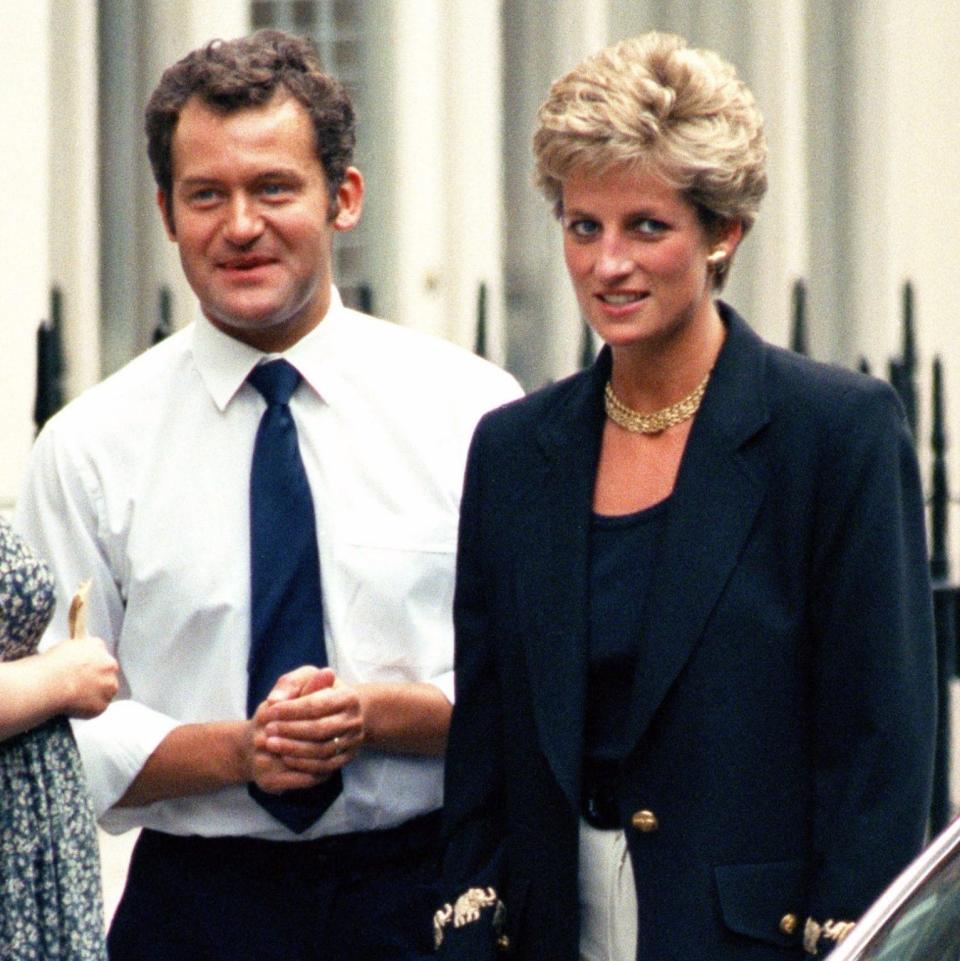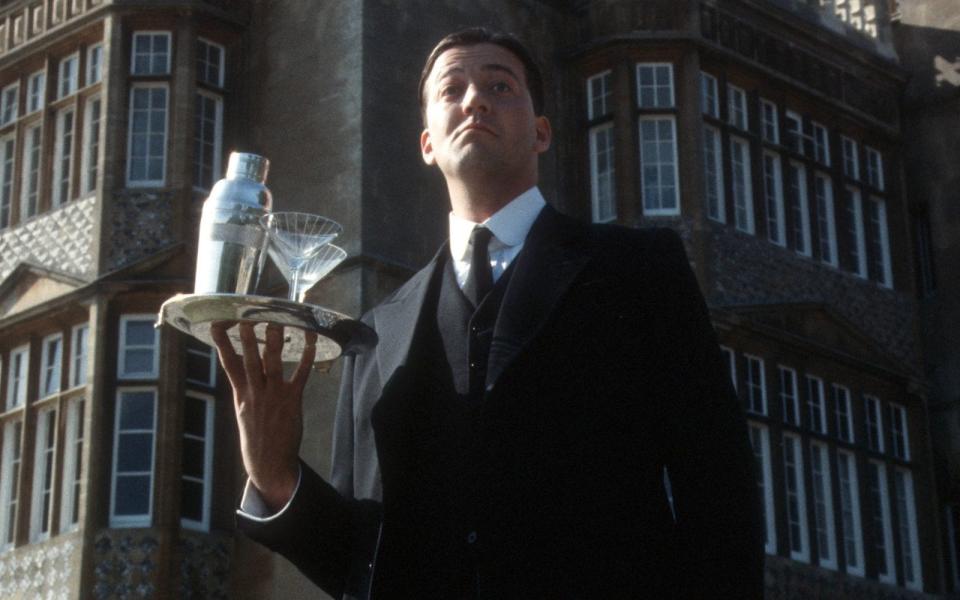A modern butler speaks: ‘Discretion and loyalty are everything – Paul Burrell was a disgrace’

Butler Eduardo Dos Santos, with his six-figure salary, slim-fitting navy suit, super-groomed brows, smoothed hair and three decades of buttling experience from waiting tables at Windsor Castle to polishing the silverware in Beverly Hills, sits at the very top of the international butler tree.
At 54, tanned and toned from a working life in Europe, he is far from Anthony Hopkins’s frayed but devoted butler in The Remains of the Day, whose life was thrown away to “service”. Nor does he resemble the tail-coated Mr Carson in Downton Abbey, clinging on to the regimes and protocols of the past, surveying the upstairs/downstairs life of a stately home with an air of moral superiority. Buttling the Dos Santos way involves snappy dressing – and a spot of scuba diving in the snatched hours of spare time.
Mr Carson and Downton Abbey, The Crown and, perhaps, the “Harry and Meghan Effect” have combined with an increasing number of UHNW (ultra high net worth) individuals to prompt a doubling in the demand for butlers in the last decade.

At the same time, fortunately, there has been a huge increase in the number of people wanting to be a butler – 40 trained applicants for one post typically – attracted by ever-increasing salaries that have far surpassed the kind commanded by those who once worked for the aristocracy. Those butlers might get £40,000 at most, poor chaps. Today’s new breed? £150,000: “People will pay anything for a British butler,” says Sara Vestin Rahmani, founder and owner of the Bespoke Bureau and the British Butler Academy, which has 368 butlers on its books.
The role is barely recognisable today from what it once was. A butler’s master and mistress – known as the “principals” – are no longer battling the plumbing and the elements in a decaying stately home while wearing layers of darned knitwear. They are more likely to be in head-to-toe designer wear, moving between yacht, villa, chalet, penthouse and estate. Where old-school butlers laid and waited tables, poured wine and greeted guests, Dos Santos is a new breed: let’s call it “executive” (much like “executive” assistants and “executive” nannies).
When we meet, Dos Santos is in London on a three-week holiday from his employers. His lips are sealed on the juicy details. He’s signed a non-disclosure agreement, which means he’d lose his job if he told me who they are. He runs their villa estate in Europe, with 20 staff beneath him. He is perfectly happy with the title of plain old “butler”, but clarifies: “it’s a new role that is mixed with “house manager, chief of staff and lifestyle concierge”. It has grown to meet the new rich in the UK, and increasingly from the Middle East, the Far East, Asia and America. He has Standard Operating Procedure manuals for every part of the house, because you don’t clean the £50,000 chandelier by waving a feather duster at it, nor do you wipe down the Picasso with window wash or clean the Italian marble with bleach. Everything has to be done properly.
“All the residences are ‘smart’ residences now,” Dos Santos says with the closest he gets to a wince. Imagine? The security systems, the light systems, the gates, the heating, the air con. It’s all on an app. It’s bad enough with one TV, let alone multiple systems across a huge estate: “And there is always a glitch and so you have to be ready.” This is when he or one of his staff will whip out the corresponding SOP: “I learnt to draw up the manuals from being a butler at the Lanesborough Hotel.”

“The role of the butler has changed,” confirms William Hanson, etiquette coach and author of the upcoming book Just Good Manners: “But people’s popular culture reference points for butlers are still stuck in a previous era because, frankly, that is more romantic than the butler of today. Often, butlers are referred to as household controllers, perhaps even estate managers; or people have an estate manager whose roles include more conventional buttling duties. The uniform has changed too. Polo shirts or smart casual attire is more what we see now. Perhaps the person in the butler role might be in a sports jacket with an open-neck shirt and chinos, and the more junior staff in open neck polo shirts.
“Obviously Buckingham Palace and Royal residences are slightly different and staff do wear livery most of the time, but that is different from an aristocratic or ‘new money’ residence.”
I talk with Dos Santos in the high-end staff management agency Irving Scott, which has been placing him with UHNW families since the agency started 12 years ago. He is considered among the best in the business. He hasn’t had many of his own horror stories over his 30-year career, “except when a chef for an important dinner didn’t turn up and I had to run to Harrods, buy the food, cook the food and serve it. And often you sit in traffic doing that for 40 minutes there and back. I cooked the meal and the guests didn’t notice. We have to be trained in all eventualities.”
He knows how to flower-arrange. He can sort out the wardrobe too, what he calls “valeting” – which I think means dry cleaning and laundering and mending – and he loves a bit of personal shopping (even if it’s not personal to him). “I can happily choose my principal a suit.”
“These new kinds of employers often need educating,” says Paloma Irving, founder of Irving Scott. “They do tend to learn from their friends.”
It is rare that a principal will deal with staff, preferring to use their PA: “That is my only stress,” says Irving of her job, “because I am confident in the butlers I put forward, but they are often entering households with multiple staff and it only takes one bad apple.”
“I do like about an hour a week with my principal,” says Dos Santos, “but I don’t need that much.” He might show him some fabric swatches, for example, for a new suit “although I’m very capable. The female principals are more demanding,” he says discreetly. How so? “Party entertaining. You have to be a party planner too.”
Dos Santos is among the best. He came to Britain in his early twenties and trained first as a sommelier, then started buttling through hotel training schemes. He is 100 per cent committed. He is not what is known as a “travel butler” (multiple locations); nor a F&B butler (only food and beverage): “An F&B butler couldn’t do what I do.”
His wife and two sons live in London in the family home. He is often away for months at a time. He is a small compact man, super-smart with fine features and a Brazilian accent. His grey silk tie is sumptuous, his cuffs perfectly starched. He speaks Spanish and Italian as well as flawless English and his native Portuguese. The six-figure salary is, of course, a draw but so is the evident pride in the ability to keep the whole show on the road: “I do it for my children,” he says of the long months away from home.
Sara Vestin Rahmani says that her bureau trains 50 new butlers each year, either privately or through their current jobs, with training initiated by employers. There are many modules on offer, some eye-opening; Middle Eastern employers; Chinese Etiquette; The Brits; Etiquette of the Brits; Chinese tea service; the emotionally intelligent butler; a butler’s day with a Russian employer; Russian Expectations. And so it goes on.
The international element – China, Russia, the Middle East – brings new meaning to the phrase What the Butler Saw, but Dos Santos says: “Discretion and loyalty are everything.” Butlers never spill (secrets or fine wine) unless they are Paul Burrell, who famously wrote a book about his own special “principal” – the late Diana, Princess of Wales, an outcome Dos Santos calls “absolutely disgraceful.”
Douglas Harrod, now 94 and in a residential home, was the old-fashioned butler at Althorp House, in Northamptonshire, where the then Lady Diana Spencer grew up. He rose from the role of pantry boy and has said of that time: “She would come into my butler’s pantry and make me a cup of coffee and then wash up my cup.” Somehow, I can’t see the new breed of 21st-century principal doing this.
The late Robert Maxwell, for whom Harrod also butled, was, in his words “the most demanding client, yes. He never thought that anyone should refuse him anything. It was… a test, but an exciting life.” Donald Trump’s butler at his Palm Beach estate Mar-a-Lago famously served him burgers in bed – with ketchup – and lined up multiple opened cans of Coke for him to drink. “He liked everything ‘gold’” he has said admiringly, although The Donald could not be persuaded by him to eat his steak more rare.

Both Vestin Rahmani and Irving confirm there are deluged with applications from butlers – many desperate to get to America – and they are not always of a good standard: “One man recently wrote “I want to be a butler like Alfred Pennyworth, the true British Butler in Batman,” says Vestin Rahmani. That CV went in the bin.
“Despite the number of applicants, it is difficult to find a candidate who can embrace everything and be flexible, like Eduardo can,” admits Irving.
The new breed of principals come from finance, industry and tech: “We are getting increasing numbers of calls from Florida and Austin, Texas,” says Irving.
“I know so many butlers who are very keen to move to the States,” says Dos Santos. “It’s the visa situation that holds us up,” Irving explains.
There are risks from this new UHNW employers: “What perhaps the super-rich or ‘new money’ do not understand is that it is not this ‘them and us’ mentality,” explains Hanson.
“The staff in Downton were living in the same house as the family – as they still do today in some of the huge grand old houses – and the upstairs needed the downstairs as much as the downstairs needed the upstairs and there was this lovely symbiotic harmony. It was not the ‘you work for me, you do what I what I tell you – click my fingers, I want this yesterday’ mentality, which is what perhaps sometimes happens with those who have come into wealth more recently so have not grown up in the environment having staff and so aren’t really sure what is fair to ask and what is not fair to ask.”
Dos Santos has no complaints: “My principals are never rude to me. If there is rudeness, you cannot take it personally. It is a job and when something goes wrong, a job needs to be done to fix it. You are working in their home and sometimes, unfortunately you are going to be in the firing line. You need to be able to handle it.”
Unacceptable behaviour from “principals” was bleakly highlighted this month when members of the Hinduja family, Britain’s richest family with a net worth of more than £37bn, were handed prison sentences for exploiting their servants, most of whom were illiterate Indians, at their Swiss villa. Many of the staff were given little or no time off and were paid the equivalent of £6.19 to work an 18hr day, seven days a week. In contrast, a budgeting file called “Pets” showed the family spent around £8,000 a year on their dog. A Swiss criminal court found Prakash Hinduja, 78, and his wife, son and daughter-in-law guilty of exploiting workers and providing unauthorised employment, all sentenced to between four and four-and-a-half years in prison. They are appealing.
“Most of our clients are very well behaved. They come recommended to us, often recommended by their neighbours,” says Vestin Rahmani. “A lot of these houses run like hotels,” adds Irving. She cites the private road, Palace Green, running between London’s Notting Hill and High Street Kensington, as an example: “They have teams of security, teams of housekeepers, three or four butlers, two chefs and so on. I mostly don’t deal with the principals but with the PAs.
“Another trend we have seen is a growing demand for ex-military. You get families who specifically want butlers with a military background because the discipline is so high, and the standards are so high in the military.”
While Dos Santos is as international as his clients, there has been a further spin-off development from the concierge-style estate-managing/maitre d’ type. International families with a limitless budget can afford to employ an estate manager and a more old-fashioned butler, who has to be English, not so much to oversee the smart security system but to sprinkle propriety and good manners over a family which, while uber-wealthy, might feel unsteady about etiquette, good manners and breeding. Money might not be able to buy good taste or English charm, but these days high net worth individuals can “buy” a butler to learn from, and to teach these qualities to the next generation.
“Clients [abroad] will literally pay anything to get a British butler,” says Vestin Rahmani: “There is nothing more British than a British butler. It’s the glory of refinement of yesteryear. These families can bring in tutors for their children, they can purchase British goods like Burberry, but to have a real life British butler in the house brings that refinement to life for the children who will then be sent to British boarding schools.
“The principals’ children can watch how the butlers talk, how they move, their mannerisms, and then replicate this when they go to school in Britain. My international clients will pay anything to have someone like that in the home.
“I’m currently looking for a butler in a home like this in Vietnam and I have told them think £85,000, probably at the absolute minimum.”

There are requests too for female butlers (dress code similar to the male butlers): “East Asian clients with daughters in particular ask for women butlers because they are role models – and women butlers are good at multi-tasking.”
There are lessons for the rest of us in this buttling lark. Dos Santos starts his day with a morning meeting with staff, after having walked around the house observing with a beady eye areas that need to be cleaned more deeply. “I will talk to the gardener, meet the guests, answer the phone, organise for the dog to have his walk and I like personal shopping. I don’t mind booking concert tickets, flights, and I’ll shop organic if I need to.”
In short, who couldn’t do with a butler? Rates are £300 a day for casual hiring – so it’s within grasp, a nice birthday present perhaps? But surely there is also a new business plan to be discussed: The Butler School for Husbands. It will be a sell-out, whether the husbands want to attend or not. I like the idea of being principal in my own home. I can think of many other women who would too.

 Yahoo News
Yahoo News 
